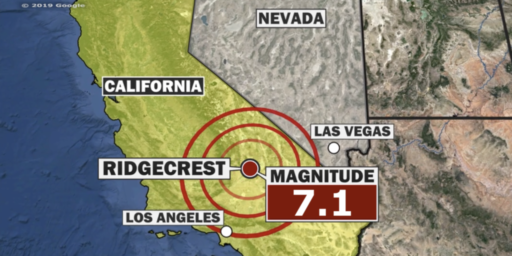War Straining Equipment
NYT: Sand, Rough Roads and Insurgents’ Bullets Place a Tremendous Strain on Army Equipment [RSS]
The Army is wearing out its equipment in Iraq and Afghanistan as much as 10 times as fast as in peacetime, straining the service’s ability to repair battlefield weaponry, and accelerating the point at which entire fleets of costly trucks and aircraft need to be replaced, the Army’s chief logistician warned this week.
Army drivers hauling supplies to Iraq from Kuwait are putting 80,000 miles a year on heavy trucks and tractor-trailers that had been expected to log only 8,000 miles to 10,000 miles a year. Troops are complaining of a shortage of windshields, which are shot out by insurgents’ fire or pitted with rocks that kick up on rough Iraqi or Afghan roads. Fine desert sand is gnawing away at helicopter rotor blades at an alarming rate. The Army is struggling to supply batteries to power radios, computers, laser range finders and night-vision goggles.
The logistician, Gen. Paul J. Kern, chief of the Army Materiel Command, said his far-flung supply network had so far averted any crippling shortages despite attacks on convoys in Iraq that have reduced the flow of equipment to 70 percent of capacity. But he said the supply system was just keeping pace with the demand for spare parts.
“We’re meeting the requirements but we don’t have a lot of slack,” General Kern said in an interview last Monday at his headquarters at Fort Belvoir, Va. “If you’re in the supply business, you’d like to say you have six months of supplies on the shelf. Right now, we are delivering to meet demands. We’re not building any significant reserves.”
That equipment wears out more quickly when used is hardly a revelation. It is clear that, however, that given what appears to be a long-term war footing, we need to significantly revamp the defense infrastructure. The post-Cold War “peace dividend” closed a lot of the factories and displaced many of the workers who were in the military equipment business. We’re now left with too little capacity for the geared up opstempo.




